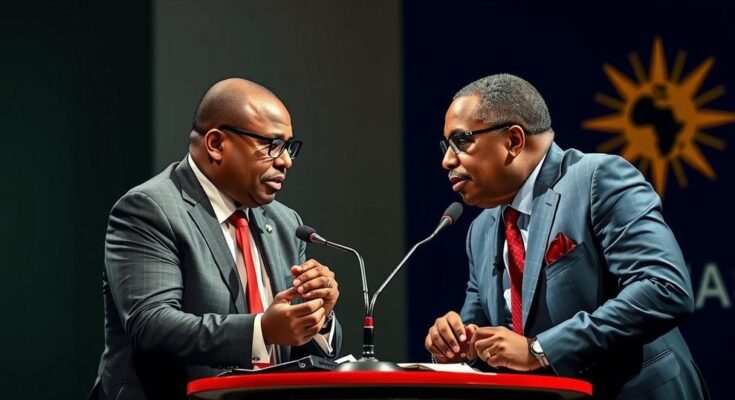Namibia is conducting a major election featuring Netumbo Nandi-Ndaitwah of Swapo striving to be the first female president, facing tough competition from IPC’s Panduleni Itula. Challenges like high unemployment and corruption have diminished Swapo’s support. Voter turnout appears strong, with crucial implications for the future governance of the nation, particularly among young voters who constitute a significant portion of the electorate.
In Namibia, voting commenced for what is anticipated to be the most competitive election since the nation’s independence from South African rule 34 years prior. Netumbo Nandi-Ndaitwah is campaigning to become the first female president of the country, representing the ruling South West Africa People’s Organisation (Swapo). The election is consequential following the recent death of President Hage Geingob. Although Swapo has maintained power since independence in 1990, challenges such as high unemployment, poverty, and corruption allegations have significantly reduced their support.
Nandi-Ndaitwah’s principal opponent is Panduleni Itula of the Independent Patriots for Change (IPC), among 14 additional candidates. Local reports indicate long queues formed at polling stations, commencing at 07:00 local time and concluding at 21:00. A candidate must secure more than 50% of the vote to claim victory outright; otherwise, a runoff between the top two candidates will occur. Nandi-Ndaitwah, with 25 years of government service, cast her vote in Windhoek, encouraging citizens to participate in the election.
Itula, having previously garnered 29% of the vote in 2019, emphasized the significance of the day for Namibia’s democratic progress. Currently led by interim President Nangolo Mbumba, who succeeded Geingob posthumously, he is not a candidate in this election. Analysts suggest the engagement of young voters, who constitute over half of the electorate, could be pivotal in determining the outcome. Additionally, voters will select new members of parliament during this election, impacting the nation’s future governance.
Namibia has faced considerable socio-economic challenges since its independence, particularly concerning unemployment, poverty, and allegations of government corruption. The ruling party, Swapo, has been entrenched in power since 1990, leading to growing discontent and a desire for change among the populace. The significance of this election is heightened by the historic candidacy of a woman and the potential shift in political dynamics, as younger voters wield increasing influence in the electoral process. The nation’s political landscape reflects deep-seated cultural norms, and the efforts of candidates like Nandi-Ndaitwah illustrate the tension between traditional values and the evolving demands of a more progressive electorate.
The Namibian election is not only a pivotal moment for its political landscape but also a reflection of the aspirations of its citizens for a government that addresses their current challenges. With Netumbo Nandi-Ndaitwah seeking to make history as the first female president and Panduleni Itula emerging as a significant contender, the results could redefine the country’s future direction. Young voters are expected to play a crucial role in determining the election outcome, ultimately shaping Namibia’s governance for years to come.
Original Source: www.bbc.com




